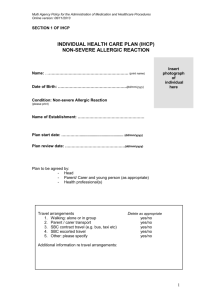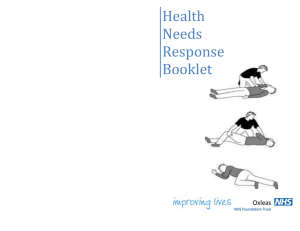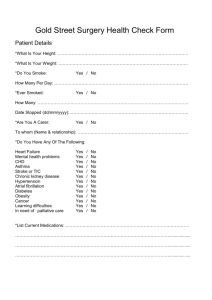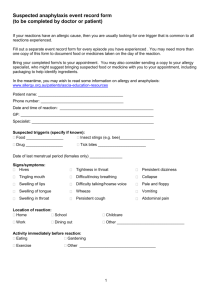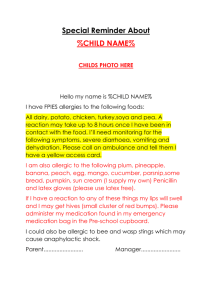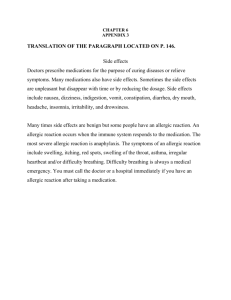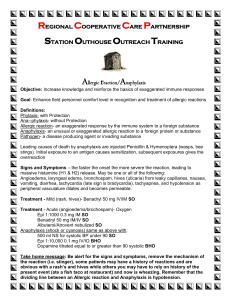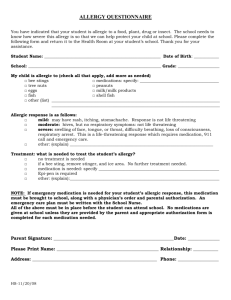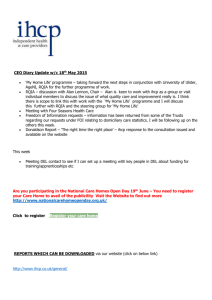IHCP Severe Allergic Reaction: Anaphylaxis
advertisement
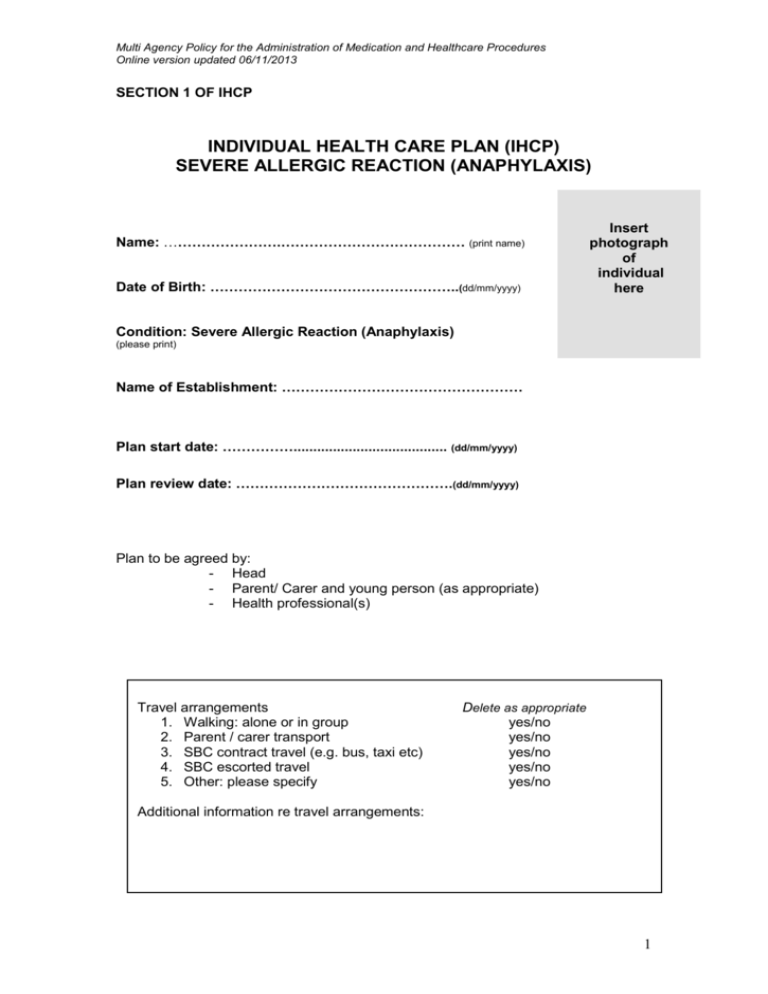
Multi Agency Policy for the Administration of Medication and Healthcare Procedures Online version updated 06/11/2013 SECTION 1 OF IHCP INDIVIDUAL HEALTH CARE PLAN (IHCP) SEVERE ALLERGIC REACTION (ANAPHYLAXIS) Name: …………………….………………………………… (print name) Date of Birth: ……………………………………………..(dd/mm/yyyy) Insert photograph of individual here Condition: Severe Allergic Reaction (Anaphylaxis) (please print) Name of Establishment: …………………………………………… Plan start date: ……………....................................... (dd/mm/yyyy) Plan review date: ……………………………………….(dd/mm/yyyy) Plan to be agreed by: - Head - Parent/ Carer and young person (as appropriate) - Health professional(s) Travel arrangements 1. Walking: alone or in group 2. Parent / carer transport 3. SBC contract travel (e.g. bus, taxi etc) 4. SBC escorted travel 5. Other: please specify Delete as appropriate yes/no yes/no yes/no yes/no yes/no Additional information re travel arrangements: 1 Multi Agency Policy for the Administration of Medication and Healthcare Procedures Online version updated 06/11/2013 SECTION 2 OF IHCP: NAME OF MEDICAL CONDITION AND SUMMARY OF HELP THAT CHILD NEEDS Anaphylaxis is a severe, life-threatening generalised or systemic hypersensitivity reaction which is likely when both of the following criteria are met: 1. Sudden onset and rapid progression of symptoms 2. Life-threatening airway and/or breathing and/or circulation problems (Children & Young People’s Allergy Network Scotland, 2013) Administration of oral Antihistamine (e.g. Piriton) Where there is recognised experience of child/young person having only ever suffered mild allergic reaction symptoms and not been prescribed an adrenaline auto injector then the condition can sometimes be controlled by the administration of a single prescribed dose of oral antihistamine (e.g. Piriton). Mild symptoms can be described as a localised rash. Where an oral antihistamine is administered parents must be immediately notified by the establishment, using the information shown on the Individual Health Care Plan and the child collected from establishment. In some cases the symptoms may become worse and the child should be monitored carefully to determine if further action is required such as administration of the adrenaline auto-injector , where prescribed and calling 999 for an ambulance. It should be noted that where a mild reaction has been controlled by oral antihistamine then there can occasionally be a rebound reaction 6 – 7 hours later. Many children who have adrenaline auto injectors also have a prescribed oral antihistamine (see Section 3 Flow Chart). Children who also have asthma may also be prescribed a reliever via a spacer/inhaler (see Section 3 Flow Chart). 2 Multi Agency Policy for the Administration of Medication and Healthcare Procedures Online version updated 06/11/2013 SECTION 3 OF IHCP: FLOW CHARTS / EMERGENCY PROCEDURES To be completed by health professional RECOGNITION OF SIGNS/SYMPTOMS AND MANAGEMENT OF SEVERE ALLERGIC REACTION (ANAPHYLAXIS) Name: ……………………………… DOB: ………/………/……… Allergic to …………………………………………….. Previous symptoms: Use Auto – injector in the following circumstances – Recognition of Anaphylaxis, i.e. following three criteria are fulfilled 1. Skin and or mucosal changes (flushing, urticaria, angioedema ) 2. Sudden onset and rapid progression of symptoms 3. Life threatening Airway and /or Breathing and /or Circulation problems AIRWAY BREATHING CIRCULATION Hoarse Irregular Hot and flushed Itchy or swollen throat Wheezy Pale or clammy Swollen tongue Noisy Decreased conscious level Can’t speak Blue round mouth Do not administer adrenaline on the basis of an isolated skin rash. Prescribed Adrenaline Auto-Injector (specify EPIPEN and dose) …………………………………………………………………………………………….. Immediate Action Detect Symptoms – Alert appropriate staff member………………………………… Administer Auto - injector into patients upper outer thigh Stay with patient at all times May be more comfortable in an upright position to aid breathing If unresponsive place patient in the recovery position If no improvement in 5 minutes, give second Auto - injector At the same time as above another staff member must phone 999 Ambulance Stating Anaphylaxis and location Secondary Action: Parents should be phoned ASAP. Parents Number Emergency contact (if parent unavailable) Home Home Work Work Mobile Mobile 3 Multi Agency Policy for the Administration of Medication and Healthcare Procedures Online version updated 06/11/2013 ACTION PLAN: Non-severe Reaction Tingling lips Localised rash (hives) Facial swelling Severe Reaction Swollen tongue Hoarse voice, difficulty swallowing Cough, difficulty breathing, noisy breathing Change in colour, pale, clammy Feeling faint Deteriorating consciousness Collapse Give antihistamine Lie child down and raise child’s feet if breathing not compromised If asthmatic, give reliever via spacer (2 puffs). Another 8 puffs, 1 puff per minute can be given. Administer Adrenaline Auto-injector Contact parent/carer to inform them that their child has had an allergic reaction and they will need to collect child to go home. Supervise closely 1. Phone 999 for an ambulance 2. Follow instructions from ambulance control 3. Contact parent/carer 4. Stay with child 5. Give Adrenaline Auto-injector to ambulance staff If condition worsens to severe reaction 4 Multi Agency Policy for the Administration of Medication and Healthcare Procedures Online version updated 06/11/2013 SECTION 4 OF IHCP: CONTACT NUMBERS AND FURTHER INFORMATION ABOUT ANAPHYLAXIS General Practitioner: Name:……………… ……………………………………Tel:-……………………. Parents / carers number: Home....................................... ……………………………. Work ……………………………………………………………… Other/ Mobile/s ………………………………………………….. Emergency Contact *(alternative) *If parent / carer unavailable. School Nurse / other health professionals: Name/title:……………… ……………………………………Tel:-……………………. Name/title:……………… ……………………………………Tel:-……………………. Useful websites http://www.cyans.org.uk/ www.anaphylaxis.org.uk www.allergyfoundation.com (British Allergy Foundation) www.allergyuk.org www.allergyinschools.org.uk www.epipen.co.uk SECTION 5 OF IHCP: ADDITIONAL INFORMATION It is the responsibility of parents / carers to maintain in date medication Include following information if relevant on an individual basis The establishment should take all reasonable steps to ensure that the child/young person does not eat any foods other than those approved by the parents. Parents/carers will provide suitable food to meet the child or young person’s needs on a daily basis (including mid-morning snack, packed lunch and suitable sweets). Parents/carers must remind their child regularly of the need to refuse any food items which might be offered by other children. 5 Multi Agency Policy for the Administration of Medication and Healthcare Procedures Online version updated 06/11/2013 SECTION 6 OF IHCP: RECORD OF TRAINING FORM Please enter name of procedure and details of the training provided to carry out the procedure.* * To be completed by the trainer The persons listed below have received training in the above procedure(s to detect, recognise and competently respond to the symptoms that require administration of medication or health care procedure to be carried out. Name (print) Signature. Date of training Signature. Date. Training delivered by: Name (print). 1 2 Trainer designation. (E.g. school nurse; diabetes specialist nurse etc) 1 2 The trained persons shown above have been accepted to carry out the above named procedure Head Signed : (print name) Establishment: Date:- 6 Multi Agency Policy for the Administration of Medication and Healthcare Procedures Online version updated 06/11/2013 SECTION 7 OF IHCP: Signatures / Agreement to Individual Health Care Plan Individual’s Name:…………….……………………………………………………… (Print) Date of Birth:…………………………………………………………………….. (dd/mm/yyyy) Establishment:……………………………………………………………………………….. Plan start date:……. ……………………………………………………………. (dd/mm/yyyy) Plan review date:…. ……………………………………………………………. (dd/mm/yyyy) The content of this Individual Health Care Plan has been agreed by the undersigned. Signatory Name / Role (please print) Signature Date Head Name: Role: Health Professional(s) Name: (minimum of one signature required) Role: Name: Role: Parent / Carer Young Person (Optional if appropriate) Original document to be retained by Head Copies: Parents/Carers Health Professional(s) Other professionals (e.g. Integrated Children’s Services, Named Person, Lead Professional) Senior Education Office (SBC only) Note to health staff: copy of plan should also be kept in child/young person’s BGH record 7
